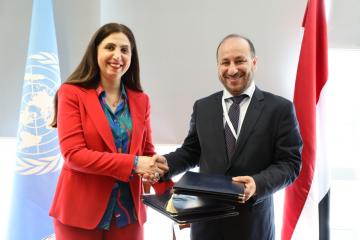
Beirut, 31 July 2019 (ESCWA)--United Nations Under-Secretary-General and Executive Secretary of the Economic and Social Commission for Western Asia (ESCWA) Rola Dashti today said the most important step in the post-conflict phase in Yemen is to engage citizens in development process at socio-economic and institutional levels. In this context, she stressed the need to develop a clear road map to address the development challenges that Yemen is facing. Dashti’s statement came after the signing of a technical cooperation framework between the Ministry of Planning and International Cooperation of Yemen and ESCWA. The framework will provide technical cooperation to Yemen through capacity-building and advisory services.
The Yemeni delegation included Minister of Planning and International Cooperation Nageeb Mansour Al-Oj; Ambassador of the Republic of Yemen in Beirut Abdullah Abdul Karim Al-Daeis; Under Secretary of Studies Sector at the Ministry of Planning and International Cooperation Mohammed Ahmed Al Hawri; Director General of the Office of the Prime Minister Mousa Mohammed Ahmed Al-Sarib; Director of Relationship Management at the Statistics Authority of Aden Fawzia Abdullah Abdullrab; Consultant at the Ministry of Social Affairs Ghazi Ali Abdullrab Rabih; Coordinator of the workshop at the Ministry of Planning and International Cooperation Gibran Al-Omrani; and Abdul Rahman Al-Ashool and Abdul Wahab Atef from the Embassy of the Republic of Yemen in Beirut.
Al-Oj, for his part, commended the interactive historical and strong bond with ESCWA. He added that the framework sets a roadmap for cooperation between Yemen and the Commission, and develops a comprehensive vision for the reconstruction phase that will boost various service sectors such as education, health and women empowerment.
Within the cooperation framework, ESCWA will provide technical support in different areas, namely: reconstruction and peacebuilding programmes; planning, economic development, policy evaluation and poverty reduction; achieving the Sustainable Development; capacity-building on the use of economic models; institutional evaluation and development; statistics field; labour market field; environment and climate change field; technology for development; decentralization; transport, seaports and logistics; women’s empowerment; and electricity sectors.
ESCWA will also implement technical cooperation activities and coordinate with other UN organizations to ensure consistency of implementation and to avoid duplication in the provision of support.
UN-ESCWA
ESCWA is one of the five UN regional commissions. It is part of the UN Secretariat, and works under the supervision of the Economic and Social Council (ECOSOC). It provides a framework for the formulation and harmonization of sectoral policies for member countries; a platform for congress and coordination; a home for expertise and knowledge, and an information observatory. It aims at supporting economic and social cooperation between the region’s countries and promoting development process in order to achieve regional integration. It helps to implement global policy frameworks, notably the 2030 Agenda for Sustainable Development and the Sustainable Development Goals (SDGs), hand in hand with its 18 member States.
The 18 member countries of ESCWA are: Bahrain, Egypt, Iraq, Jordan, Kuwait, Lebanon, Libya, Morocco, Mauritania, Oman, Palestine, Qatar, Saudi Arabia, The Sudan, The Syrian Arab Republic, Tunisia, The United Arab Emirates and Yemen.
For more information:
-Ms Rania Harb, Public Information Assistant, +961-70-008-879; email: harb1@un.org
-Ms Maryam Sleiman, Public Information Assistant, +9611978815, email: sleiman2@un.org





